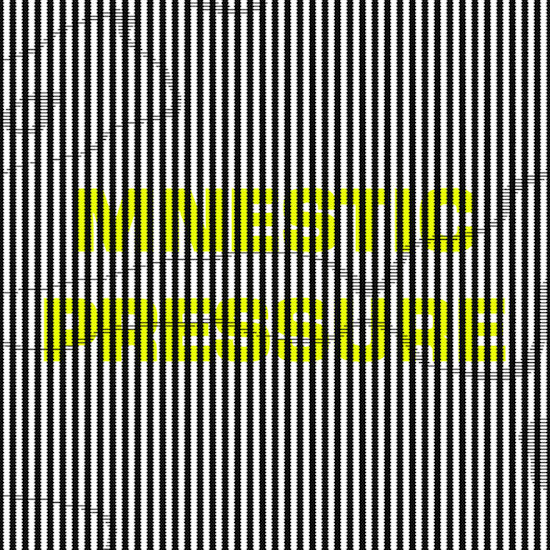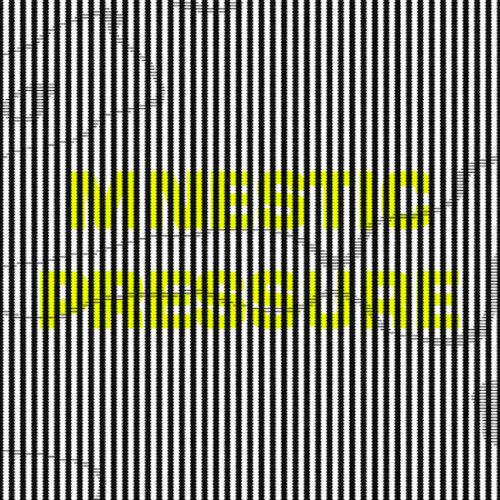Mnestic Pressure is an intriguing title for Lee Gamble’s fourth solo album. ‘Mnestic’ refers to the Greek word for memory (as in ‘mnemonic’), so is Gamble feeling the pressure of his own memories, or the collective memory of the electronic genre he operates in? For a genre so often associated with words like ‘futuristic’ and ‘modern’, electronic music is often a slave to its own past rather than a beacon illuminating the future. On Mnestic Pressure, Gamble seems to be trying to unravel the various contradictions and divergent pathways that have emerged in the digital age, to come up with something cohesive and definitive. Even embarking on such a mission should be lauded.
The year zero moment for modern electronica is probably the explosion of dubstep and grime in the early 2000s. As the heyday of 90s techno and jungle was becoming something of a distant memory, these two genres sprang from Britain’s urban sprawl and flipped conventions on their head, tapping into a new era of unease and insecurity. Both grime and dubstep were absorbed into the mainstream, their initial impact inevitably diluted, but the former continues to be a vehicle for exciting talents, especially vocalists, a way for disaffected inner city youth to make their voices heard. For dubstep, things have proved more complicated. The initial format sketched out by the likes of Skream, Benga and Distance soon proved to have its formal limitations, resulting in an explosion of derivations with increasingly odd names like ‘funky’, ‘purple sound’ and ‘wonky’. In the USA, meanwhile, the resurgence of Chicago footwork has thrown other tastes into the mix, as has a robust techno scene in places like Germany and Israel, meaning the modern electronic missive can seem torn between dubstep’s languid pace and more visceral, fast-paced dance tropes.
In the UK, this has led to a scene that is unbelievably fertile, but often disconcertingly broad and unfocused (of course, a large number of modern dance/electro producers make music alone in their homes rather than in collective spaces, another reason for such varied output). In this context, Mnestic Pressure feels like an attempt from one of the genre’s most experienced hands to bring these strands together. The album traces acute lines from ambient to techno and back again, drifting into industrial electronica, dubstep and, yes, funky along the way. It’s no surprise that Gamble is most often tagged as an IDM artist: his approach to making music is always considered and thoughtful, textures applied at exactly the right moment to elicit the perfect emotional and physical response from the listener.
As such Mnestic Pressure feels something like a live performance. Bracing, ambient opener ‘Deja Mode’ sounds like the moment the laptop revs up in a club and the lights go down, a way of absorbing the listener into Lee Gamble’s universe. After the relatively brief ‘East Sedducke’, a collage of footwork and jungle that rushes forwards on beltering breakbeats and icy synths, ‘Ghost’ established the album’s overall mood, with glimmering melodic patterns swirling around shuffling snare rhythms and ghostly voices echoing in the distance. The atmospheric DNA of dubstep lingers in the track’s core, but with the pace upped to mirror garage or jungle, something new emerges with glistening clarity. In other words, it’s a single. ‘Ignition Lockoff’, meanwhile, is a brittle example of instrumental grime, or even the strangely named sinogrime, its minimalism somehow fitting expertly alongside ‘Ghost’’s lusher tones. This may in fact be Lee Gamble’s greatest strength and why the album feels so much like it would work perfectly as a live set: even as he explores different stylistic approaches, the way he uses ambient drift to segue between the tracks, or atmospheric tracks between more forceful numbers brings a focus and coherence that too many producers who try to bridge different strains of electronic music lack.
There are multiple reference points across Mnestic Pressure: the pointillist minimal techno of ‘Quadripoints’ echoes Drexciya and the Detroit scene, while the industrial stomp and bleak atmospherics on ‘UE8’ nod to Regis or even Helm. But more often than not, Gamble’s intricate combinations of styles sound like little else out there, even Hyperdub labelmate and similarly catholic producer Ikonika. Whether or not Gamble intended for Mnestic Pressure to be an exercise in confronting modern UK electronica’s fractured past and present, it certainly resonates as such – though it’s clearly a deeply personal work, with moments of stark introspection, so there could be more intimate layers at play. But as a work that gathers up so much of what’s going on in modern dance and electronic music in 2017 and finds ways to make them click together, Mnestic Pressure feels like a game-changer, or at the very least a defining moment. Time will tell.



